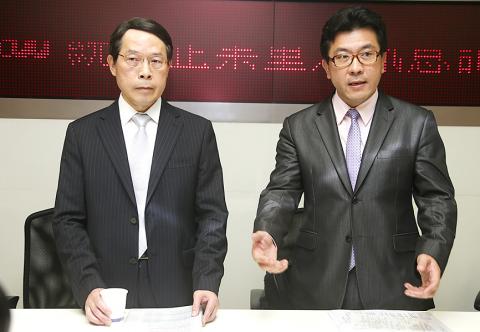The nation’s bakery industry could be the next victim of the latest cooking oil scandal after oil and fat producer President Nisshin Corp (統清) was found to have processed part of the allegedly animal feed-grade beef tallow it purchased from Ting Hsin Oil and Fat Industrial Co (頂新製油) into baking oil.
“In addition to selling 5.57 tonnes of the 15 tonnes of beef tallow it procured from Ting Hsin Oil via Mitsubishi Corp (Taiwan) to Uni-President Enterprises Corp (統一企業), its parent company, on May 30, President Nisshin used the remaining 9.43 tonnes of the potentially problematic oil to manufacture three kinds of baking oil products,” FDA Interim Director-General Chiang Yu-mei (姜郁美) told a press conference in Taipei.
The three products were “W202 Fu Shih Hsiang Bakery Oil” (富士香烘焙專用油) and “W102 Chi Hua Bakery Oil” (奇華專用烘焙油) — which were manufactured on May 30 and exported to Hong Kong — and “16JSBO (P) Ching Shih Chi shortening” (金世紀酥油), which was manufactured on June 6 and sold locally, Chiang said.

Photo: CNA
A preliminary investigation by the Greater Tainan Government’s Department of Health showed that President Nisshin used the beef tallow to produce almost 27 tonnes of baking oil, including 16 tonnes of Fu Shih Hsiang Bakery Oil, 3.2 tonnes of Chi Hua Bakery Oil and 7.696 tonnes of Ching Shih Chi shortening.
The investigation results suggested that the potentially tainted batch of shortening was sold to 26 bakery shops and food material companies nationwide, which reportedly included bakery chain Rose Pie (薔薇派).
As of press time last night, the administration had yet to receive a formal response from Vietnamese authorities to its repeated questions on whether the 2,476 tonnes of beef tallow Ting Hsin Oil had imported from Vietnam-based Dai Hanh Phuc Co over the past three years were fit for human consumption.
“Hence, all implicated companies are still required to remove their potentially problematic products from the shelves by midnight [yesterday],” Chiang said.
Separately yesterday, Uni-President interim spokesman Tu Chung-cheng (涂忠正) said consumers who have purchased the company’s 19 kinds of recalled products that were made with Ting Hsin Oil’s questionable oil can request refunds at its 7-Eleven convenience stores nationwide until Dec. 31.
“Uni-President and its subsidiary President Nisshin both unknowingly used the allegedly problematic tallow from Ting Hsin Oil, but we will begin offering refunds to consumers across the country starting today [yesterday],” Tu said.
Tu made the announcement a day after the FDA ordered a preventive recall of the company’s 17 types of instant noodle products and two spicy Japanese oden packs, following the discovery that they were manufactured using the 5.57 tonnes of refined beef tallow it bought from Ting Hsin Oil.
Uni-President vice president Tony Su (蘇崇銘) said refunds are available to consumers who can present purchase invoices or product packages, regardless of where they bought those food products.
Su said Uni-President, the nation’s largest food manufacturer, faces a loss of between NT$700 million and NT$800 million (US$23.3 million and US$26.6 million) over the scandal.
Additional reporting by staff writer and CNA

The US government has signed defense cooperation agreements with Japan and the Philippines to boost the deterrence capabilities of countries in the first island chain, a report by the National Security Bureau (NSB) showed. The main countries on the first island chain include the two nations and Taiwan. The bureau is to present the report at a meeting of the legislature’s Foreign Affairs and National Defense Committee tomorrow. The US military has deployed Typhon missile systems to Japan’s Yamaguchi Prefecture and Zambales province in the Philippines during their joint military exercises. It has also installed NMESIS anti-ship systems in Japan’s Okinawa

TRAGEDY STRIKES TAIPEI: The suspect died after falling off a building after he threw smoke grenades into Taipei Main Station and went on a killing spree in Zhongshan A 27-year-old suspect allegedly threw smoke grenades in Taipei Main Station and then proceeded to Zhongshan MRT Station in a random killing spree that resulted in the death of the suspect and two other civilians, and seven injured, including one in critical condition, as of press time last night. The suspect, identified as a man surnamed Chang Wen (張文), allegedly began the attack at Taipei Main Station, the Taipei Fire Department said, adding that it received a report at 5:24pm that smoke grenades had been thrown in the station. One man in his 50s was rushed to hospital after a cardiac arrest

‘WIN-WIN’: The Philippines, and central and eastern European countries are important potential drone cooperation partners, Minister of Foreign Affairs Lin Chia-lung said Minister of Foreign Affairs Lin Chia-lung (林佳龍) in an interview published yesterday confirmed that there are joint ventures between Taiwan and Poland in the drone industry. Lin made the remark in an exclusive interview with the Chinese-language Liberty Times (the Taipei Times’ sister paper). The government-backed Taiwan Excellence Drone International Business Opportunities Alliance and the Polish Chamber of Unmanned Systems on Wednesday last week signed a memorandum of understanding in Poland to develop a “non-China” supply chain for drones and work together on key technologies. Asked if Taiwan prioritized Poland among central and eastern European countries in drone collaboration, Lin

ON ALERT: Taiwan’s partners would issue warnings if China attempted to use Interpol to target Taiwanese, and the global body has mechanisms to prevent it, an official said China has stationed two to four people specializing in Taiwan affairs at its embassies in several democratic countries to monitor and harass Taiwanese, actions that the host nations would not tolerate, National Security Bureau (NSB) Director-General Tsai Ming-yen (蔡明彥) said yesterday. Tsai made the comments at a meeting of the legislature’s Foreign Affairs and National Defense Committee, which asked him and Minister of National Defense Wellington Koo (顧立雄) to report on potential conflicts in the Taiwan Strait and military preparedness. Democratic Progressive Party (DPP) Legislator Michelle Lin (林楚茵) expressed concern that Beijing has posted personnel from China’s Taiwan Affairs Office to its